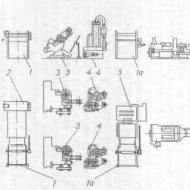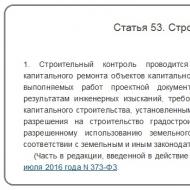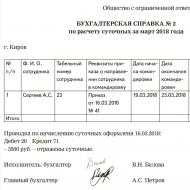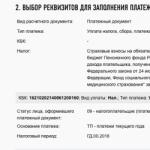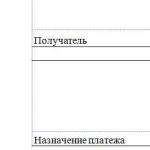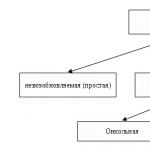
Non-operating income and expenses. What concerns non-operating expenses and income
Non-operating expenses are considered expenses that are not directly related to the production and sale of goods (works, services). An approximate list of such expenses is given in article 265 of the Tax Code of the Russian Federation. In particular, they include:
1) expenses for the maintenance of the leased property (if the company leases the property no more than once a year);
2) interest paid on loans, borrowings and other received debt obligations as well as released securities(within the limits of norms);
3) expenses for organizing the issue of securities: preparation of the issue prospectus, production of forms, registration of securities, etc .;
4) negative exchange rate differences that arise when buying and selling foreign currency, as well as when revaluing property and liabilities in foreign currency;
5) the sum differences in the sale (posting) of goods (works, services, property rights);
6) the costs of creating reserves for doubtful debts from firms, which determine income and expenses on an accrual basis. The bad debt reserve can be used by the organization only to cover losses from bad debts.
7) expenses for the liquidation of buildings and equipment;
8) the costs of maintaining the mothballed buildings and equipment;
9) court costs and arbitration fees;
10) costs of canceled production orders and non-production production;
11) fines, penalties and other sanctions recognized or awarded by the court for violation of the terms of contracts, as well as the amount of compensation for losses or damage;
12) taxes on the amounts of accounts payable that the company wrote off due to the expiration of the limitation period or for other reasons (for example, VAT);
13) payment costs banking services;
14) losses of previous years identified in this year;
15) losses from downtime for internal and external reasons;
16) losses from natural disasters, fires, accidents.
The list of non-operating expenses is not closed, i.e. subject to expanded interpretation when meeting the requirements of Article 252 of the Tax Code of the Russian Federation.
The tax base
The tax base is the monetary expression of taxable profit.
The income and expenses of the taxpayer are recorded in cash.
Income received in kind as a result of the sale of goods (work, services), property rights (including commodity exchange transactions) is taken into account based on the transaction price, taking into account the provisions of Article 40 of the Tax Code of the Russian Federation
When determining the tax base, the profit subject to taxation is determined on an accrual basis from the beginning of the tax period.
The tax base for income tax is formed separately:
If profits are subject to different rates;
For transactions involving the sale of purchased goods (Article 268 of the Tax Code of the Russian Federation).
If in the reporting (tax) period the taxpayer incurs a loss - the negative difference between income and expenses accounted for for tax purposes, in this reporting (tax) period the tax base is recognized as zero.
Taxpayers who have suffered a loss in the previous tax period have the right to reduce the tax base of the current tax period by the entire amount of the loss they received or by a part of this amount (carry forward the loss for the future).
The taxpayer has the right to carry forward the loss for the future within ten years following the tax period in which this loss was received.
In 2006, the aggregate amount of the loss carried forward could not exceed 50% of the tax base of any reporting period and the tax period as a whole, since 2007 there is no such limitation.
Example. The organization as of December 31, 2005 had a loss in the amount of RUR 100,000. The tax base for income tax in 2006 was 80,000 rubles, and in 2007 - 50,000 rubles, in 2008 - 25,000 rubles.
In this example, only the amount of loss amounting to 40,000 rubles could be accepted to reduce the tax base in 2006. (50% of 80,000 rubles). The amount of the loss reducing the tax base in 2007 amounted to 50,000 rubles. (100% of 50,000 rubles). The remaining amount of the loss is 10,000 rubles. (100,000 rubles - 40,000 rubles - 50,000 rubles) is carried over to 2008 and the tax base for 2008 is equal to 15,000 rubles.
A loss arising from the application of the 0% (preferential rate) rate is not carried forward to future tax periods in which, for example, the 20% rate applies.
The loss received when applying special tax regimes (simplified taxation system and unified agricultural tax), in the event of a transition to a general taxation regime, is not taken into account in the tax base for income tax.
Some losses are carried forward on a special basis. Such features are set for losses:
From the activities of service industries and farms (Article 275.1 of the Tax Code of the Russian Federation);
For operations with securities (Article 280 of the Tax Code of the Russian Federation);
For transactions with financial instruments urgent transactions (Article 304 of the Tax Code of the Russian Federation);
For operations with depreciable property (Article 323 of the Tax Code of the Russian Federation);
For operations on assignment (assignment) of the right of claim (Article 279 of the Tax Code of the Russian Federation).
The organization is obliged to keep documents confirming the amount of the loss incurred for the entire period when it reduces tax base the current tax period for the amount of previously received losses (clause 4 of article 283 of the Tax Code of the Russian Federation).
Composition of expenses
The composition of non-operating expenses that reduce the tax base for income tax is given in paragraph 1 of Article 265 of the Tax Code of the Russian Federation. These include, in particular:
- interest paid on the borrowed funds received;
- expenses for the maintenance of the leased property;
- negative differences in the purchase and sale of foreign currency, as well as in the revaluation of property and foreign exchange liabilities;
- exchange differences (negative). For transactions that were concluded before January 1, 2015, but are executed after this date, negative sum differences ... When taxing profits, such expenses consider in the same order (clause 3 of article 3 of the Law No. 81-FZ on April 20, 2014, letter of the Ministry of Finance of Russia dated March 30, 2015 No. 03-03-06 / 1/17387);
- expenses for the liquidation of fixed assets;
- costs of maintaining mothballed buildings and equipment;
- legal costs and arbitration fees;
- fines, penalties and other sanctions for violation of contractual obligations in relations with counterparties.
Some types of losses are equated to non-operating expenses. For example, the tax base for income tax is reduced:
- losses of previous years revealed in the current reporting (tax) period;
- the amount of bad debts (if the organization creates a reserve for doubtful debts, the amount of bad debts not covered by the reserve);
- shortages material values(in the absence of guilty persons);
- losses from natural disasters and emergencies.
This is stated in paragraph 2 of Article 265 of the Tax Code of the Russian Federation.
The list of non-operating expenses is open. Consequently, other expenses that are not related to production and sales can be written off as a reduction in the tax base for income tax (subparagraph 20 of paragraph 1 of article 265 of the Tax Code of the Russian Federation). But provided that they meet the criteria of paragraph 1 of Article 252 of the Tax Code of the Russian Federation. That is, if these costs are economically justified and documented.
Moment of recognition of expenses
If the organization applies accrual method, include non-operating expenses in the calculation of the tax base in the manner prescribed by paragraph 7 of Article 272 of the Tax Code of the Russian Federation. If the organization uses the cash method, write off non-operating expenses in the manner prescribed by paragraph 3 of Article 273 of the Tax Code of the Russian Federation. Dates of recognition of expenses in use accrual method and when using cash method are given in the corresponding tables.
Situation: at what point, when calculating income tax, can the amount of the shortfall be included in expenses if the perpetrators of the theft have not been identified?
The answer to this question depends on the method by which the organization determines income and expenses for calculating income taxes.
If the organization uses the accrual method, the shortage can be written off as expenses at the time when the fact of the absence of the guilty persons is documented (subparagraph 5 of paragraph 2 of article 265 of the Tax Code of the Russian Federation, paragraph 1, subparagraph 3 of paragraph 7 of article 272 of the Tax Code of the Russian Federation) ... When using the cash basis for accounting expenses, you must also confirm full payment property, the shortage of which has been identified (clause 3 of article 273 of the Tax Code of the Russian Federation).
The requirement for documentary confirmation of the absence of perpetrators fully applies to organizations retail, in which shortages arise as a result of theft from self-service trading floors (letter of the Ministry of Finance of Russia dated November 8, 2010 No. 03-03-06 / 1/695).
The documents confirming the fact that there are no guilty persons are acts of authorized departments (for example, preliminary investigation bodies, courts) (subparagraph 5, clause 2 of article 265 of the Tax Code of the Russian Federation). The legislation does not establish a specific list of such documents.
So, the Ministry of Finance of Russia in letters dated June 20, 2011 No. 03-03-06 / 1/365, dated June 8, 2009 No. 03-03-05 / 103 and dated December 27, 2007 No. 03-03-06 / 1/894 indicates that the basis for recognizing losses from theft when calculating income tax may be a copy of the decision to suspend the preliminary investigation. Based on this document, the amount of the shortfall can be included in the non-operating expenses of the reporting (tax) period in which the decision was made.
This point of view is also shared by some arbitration courts (see, for example, Resolutions of the FAS of the Moscow District of April 18, 2011 No. KA-A40 / 3277-11, of January 16, 2008 No. KA-A40 / 13948-07, Ural District dated June 3, 2008 No. F09-3931 / 08-C3, Volga District dated July 5, 2007 No. A72-4858 / 06, Volgo-Vyatka District dated August 21, 2006 No. A79-807 / 2006, North-West District of February 9, 2006 No. A56-9808 / 2005, West Siberian District of February 9, 2006 No. A56-9808 / 2005).
If the preliminary investigation was carried out in the form of an inquiry, the cost of the stolen inventory items can be written off at the date of the decision to suspend the inquiry (letter of the Ministry of Finance of Russia dated August 3, 2011 No. 03-03-06 / 1/448).
In addition, the basis for writing off losses from theft is a copy of the decision to terminate the criminal case (letter of the Ministry of Finance of Russia dated January 20, 2006 No. 03-03-04 / 1/52). Such a decision can be made by the investigator only after the expiration of the statute of limitations for criminal prosecution (part 1 of article 78 of the Criminal Code of the Russian Federation).
When the case is being considered in court, the fact of the absence of the perpetrators can confirm the acquittal (part 2 of article 302 of the Criminal Procedure Code of the Russian Federation). This document will be the basis for writing off losses (shortages) from property theft.
Advice: there are arguments that allow organizations to determine the moment of writing off losses from theft when calculating income tax on the basis of any document from an authorized agency confirming the fact that there are no guilty persons. They are as follows.
Subparagraph 5 of paragraph 2 of Article 265 of the Tax Code of the Russian Federation does not contain a specific list of supporting documents that indicate the absence of persons responsible for the shortage. Consequently, the basis for writing off losses in taxation of profits in such a situation can be any supporting document of the authorized department. For example, letters or certificates issued by authorized officials bodies of internal affairs, which indicate that there are no perpetrators of theft. Some arbitration courts confirm the legitimacy of this approach (see, for example, the definition of the Supreme Arbitration Court of the Russian Federation of December 10, 2007 No. 16216/07, Resolution of the FAS of the West Siberian District of August 7, 2007 No. F04-5161 / 2007 (36812-A46- 15), Moscow District of November 9, 2007 No. KA-A40 / 1 0001-07).
Situation: is it possible, when calculating income tax, to include in the composition of expenses the cost of rented property lost (damaged) as a result of emergencies?
Yes, you can, if the lease agreement provides for the lessor's right to compensation for damage caused to his property through the fault of the tenant.
When calculating income tax, justified and documented costs are taken into account that are associated with the organization's activities aimed at generating income (Article 252 of the Tax Code of the Russian Federation). In the cases provided for in Article 265 of the Tax Code of the Russian Federation, some types of documented losses can be attributed to expenses that reduce taxable profit.
In accordance with subparagraph 6 of paragraph 2 of Article 265 of the Tax Code of the Russian Federation, losses from natural disasters, fires, accidents and other emergencies, including costs associated with the prevention or elimination of their consequences, are equated to non-operating expenses. Such losses, in particular, include the cost of destroyed or damaged stocks, goods, materials and other property belonging to the organization. The property belonging to the organization must be reflected in its accounting separately from the property of other organizations (clause 5 PBU 1/2008). Confirmation that material assets are the property of the organization are data balance sheet... Leased property, pledged items, values received by the intermediary organization as part of the execution of the contract (commission, order, agency agreement), etc., are recorded off the balance sheet. Therefore, the value of this property does not diminish the taxable profit of the organization affected by the fire. With documentary evidence, such losses can be taken into account by the owners of the burnt property (lessor, mortgagor, principal, principal, principal).
In addition, costs associated with extinguishing and eliminating the consequences (minus the cost of the materials obtained in this case) can be included in the losses from the fire.
The cost of fire losses can be written off to expenses in the period in which you confirmed them with documents:
- a certificate from the State Fire Service;
- the protocol of the inspection of the scene;
- a fire act, which establishes the cause of the fire;
- inventory acts, which reflect the amount of damage.
Such clarifications are in the letters of the Ministry of Finance of Russia dated December 29, 2015 No. 03-03-06 / 1/77005, dated September 24, 2007 No. 03-03-06 / 1/691.
The lease agreement may provide for the lessor's right to compensation for damage caused to his property through the fault of the lessee. For example, in relation to leases Vehicle with the crew, this procedure is expressly provided for in Article 639 Civil Code RF. If the lessor has the right to demand compensation for damage (including compensation for the value of the lost (damaged) property), then when calculating the profit tax, the lessee can take into account such expenses on the basis of subparagraph 13 of paragraph 1 of Article 265 of the Tax Code of the Russian Federation.
Situation: is it possible to take into account the costs associated with reimbursement of lost profits to the counterparty when calculating income tax?
No
If, through the fault of the organization, its counterparty did not receive (could not receive) any income, he has the right to demand compensation for such lost profits (Article 15 of the Civil Code of the Russian Federation). Compensating for lost profits, the guilty organization incurs certain costs. However, when calculating income tax, you can take into account the cost of reimbursing only the real material damage(Subclause 13, Clause 1, Article 265 of the Tax Code of the Russian Federation). The costs of reimbursement of lost profits are not included in such costs. Therefore, it is unlawful to include them in expenses that reduce taxable profit.
Similar clarifications are contained in the letters of the Ministry of Finance of Russia dated July 4, 2013 No. 03-03-10 / 25645, dated October 12, 2011 No. 03-07-05 / 26 and dated September 14, 2009 No. 03-03-06 / 1/580.
Situation: how to take into account payment costs when calculating income tax bank guarantee ?
If obtaining a bank guarantee is a prerequisite for the organization's activities, include such costs in other costs associated with production and sale. Otherwise, such expenses are recognized as non-operating.
A bank guarantee is an obligation of a bank to transfer to the counterparty (creditor) of the organization a certain sum of money upon presentation of a demand for payment (Article 368 of the Civil Code of the Russian Federation). For the issuance of a guarantee, the organization must pay the bank a fee (clause 2 of article 369 of the Civil Code of the Russian Federation). Issuance of a bank guarantee is recognized banking operation(Clause 8, Part 1, Article 5 of the Law of December 2, 1990, No. 395-1).
Chapter 25 of the Tax Code of the Russian Federation provides for two options for accounting for the costs of paying for banking services:
- as part of other expenses related to production and sales (subparagraph 25 of clause 1 of article 264 of the Tax Code of the Russian Federation);
- as part of non-operating expenses (subparagraph 15 of clause 1 of article 265 of the Tax Code of the Russian Federation).
In the composition of other costs associated with production and sale, the remuneration for the issuance of a bank guarantee can be included if its receipt is a prerequisite for the organization's activities. For example, organizations that are engaged in tour operator activities are required to have a bank guarantee (or a tour operator's liability insurance contract) due to the requirements of federal legislation (Article 17.1 of the Law of November 24, 1996, No. 132-FZ). In such cases, it is necessary to take into account the costs of purchasing a bank guarantee on the basis of subparagraph 25 of paragraph 1 of Article 264 of the Tax Code of the Russian Federation.
If the payment of the bank guarantee is not a prerequisite for the organization's activities, the organization can take into account the costs associated with obtaining it on the basis of subparagraph 15 of paragraph 1 of Article 265 of the Tax Code of the Russian Federation. For example, this should be done if the need to obtain a bank guarantee is caused by the terms of the concluded agreement or the rules for holding a tender (competition) in which the organization participates.
Similar explanations are contained in the letters of the Ministry of Finance of Russia dated December 16, 2010 No. 03-03-06 / 2/214, dated January 16, 2008 No. 03-03-06 / 1/7. The arbitration courts also share this position (see, for example, the decisions of the FAS of the Volga District of March 13, 2007 No. А12-11353 / 06-С60 and of November 16, 2006 No. А12-7809 / 06-С51-5 / 38) ...
If the amount of remuneration (commission) to the bank for the provision of a bank guarantee is taken into account as part of other or non-operating expenses, then it must be included in the calculation of the tax base evenly during the guarantee period, regardless of the established payment schedule (one-time payment, quarterly, etc.). This conclusion follows from the provisions of paragraph 1 of Article 272 of the Tax Code of the Russian Federation and the letter of the Ministry of Finance of Russia dated January 11, 2011 No. 03-03-06 / 1/4.
In some cases, the finance department recommends that the costs of paying for a bank guarantee be included in the original cost of the property being acquired. For example, this should be done if the bank guarantee provided:
- return borrowed money attracted for the purchase of fixed assets;
- payment for inventory items shipped by the supplier with a deferred payment condition.
An example of reflection in accounting and in taxation of expenses for payment of a bank guarantee
The main activity of the organization "Alpha" is trade. Alfa received a bank guarantee from Nadezhny KB, which secures its obligations under the contract for the supply of goods for municipal needs. For the provision of the guarantee, Alpha paid the bank a fee in the amount of 40,000 rubles.
The costs of paying for banking services are related to other costs (clause 11 of PBU 10/99). Therefore, the Alpha accountant took into account the remuneration for the provided bank guarantee on account 91 (Instructions to the chart of accounts):
Debit 76 Credit 51
- 40,000 rubles. - remuneration paid to the bank for issuing a bank guarantee;
Debit 91-2 Credit 76
- 40,000 rubles. - the fee for the issuance of a bank guarantee is reflected in other expenses.
Obtaining a bank guarantee is subject to the requirements of a municipal contract. For the executing organization, the payment of the issued guarantee is an economically justified expense. When calculating income tax, the amount of remuneration is 40,000 rubles. the accountant of "Alpha" included in the structure of non-operating expenses (subparagraph 15 of clause 1 of article 265 of the Tax Code of the Russian Federation).
Advice: given that the order tax accounting the cost of acquiring bank guarantees is not clearly regulated, the organization can determine it independently and fix it in accounting policy for tax purposes.
If any costs with equal grounds can be simultaneously attributed to several groups of costs, the organization has the right to independently include them in one of these groups. Doing this is allowed by the norms of paragraph 4 of Article 252 of the Tax Code of the Russian Federation. Decision should be reflected in accounting policies for tax purposes. Some courts recognize that the organization has the right to determine the procedure for tax accounting of expenses for payment of banking services independently (see, for example, the resolution of the Federal Antimonopoly Service of the East Siberian District of May 2, 2006 No. A33-21067 / 05-F02-1877 / 06-C1) ...
Regardless of the chosen method of accounting, the costs of paying for a bank guarantee must be economically justified and documented (clause 1 of article 252 of the Tax Code of the Russian Federation). Documentary evidence of such expenses can be:
- an agreement between the organization and the counterparty, which specifies the requirement to obtain a bank guarantee;
- an agreement on the provision of a bank guarantee concluded with the bank.
The overwhelming majority of income and expenses of any organization is associated with the sale of goods and / or services. However, activities and financial statements is not limited to sales alone. There are very significant income and expense items associated with other business processes, they also need accounting.
Let's analyze the specifics of these financial indicators, let's dwell on the features of their reflection in accounting and in the Tax Code Russian Federation, consider their impact on the size of income tax.
Non-operating income (income)
The concept of non-operating income is given by the Tax Code of the Russian Federation. According to the text of the Code, they represent revenues to the organization's budget that are not related to the proceeds from the sale of goods, works, services, as well as to the sale of property and fixed assets of the company.
These incomes are a full part of the profits. legal entity... Art. 250 gives 2 possibilities to determine the ratio of income to non-operating income: "by contradiction" and by listing the items on the list.
What incomes are not realizable?
When the definition indicates that all the indicators except those listed are related to the defined concept, then the necessary factors can be calculated by the method of exclusion. We can say that all types of income that are not named in Art. 249 of the Tax Code of the Russian Federation. In turn, in Art. 250 of the Tax Code of the Russian Federation means that non-operating are recognized all income of the organization, except:
- amounts received as a result of the sale;
- tax-free financial receipts (they are specially stipulated in article 251 of the Tax Code of the Russian Federation).
List of non-operating income
Another approach to determining this form of profit is the transfer possible types income, which Art. 250 Tax Code refers to non-sales:
- profit received from equity participation in other associations (if additional shares are purchased for dividends, then this receipt is excluded from non-operating shares);
- fines paid to the firm, under contracts (or even not yet paid, but only awarded or recognized by the debtor);
- compensation received for damage or loss;
- insurance payments;
- profit from the lease or sublease of tangible assets or real estate (except for those situations when this activity is the main one for the company - then it is already income from the provision of services);
- assets received free of charge, for example, as a gift;
- past profit spent in the reporting year;
- the cost of surplus property credited to the balance sheet based on the results of the next inventory;
- payments of debts on loans and depositors whose statute of limitations has already expired ("unexpectedly returned debt");
- profit from the difference in exchange rates;
- the result of the revaluation of assets;
- some others.
Do not forget to include these incomes in non-operating
Taxpayers often miss certain types of profits, which also belong to non-sales, thereby, willingly or unwittingly, lowering the tax base. Nevertheless, these receipts to the organization's budget are included in non-operating income:
- interest on loans, deposits, IOUs issued (both in relations with counterparties and with the Central Bank);
- the market value of materials obtained as a result of the dismantling of the written-off property;
- charitable contributions received by the company and targeted donations used for the declared purpose;
- evaluation of written off and returned printed products;
- correction of the calculated profit due to changes in calculation methods;
- plus difference between deductions and excise taxes.
NOTE! Understatement of profits due to the omission of some items of income, admitted by intent or lack of knowledge, is fraught with trouble on the part of the controlling tax authorities: This may well be regarded as tax evasion.
Non-operating income and taxation
The significance of this type of profit lies in the influence on the formation of the tax base. Non-operating receipts must be taken into account when calculating the following types taxes:
- - the types of profit are summed up both from the sale of goods, works, services (according to Art. 249 of the Tax Code of the Russian Federation) and non-sales turnover (according to Art. 250 of the Tax Code of the Russian Federation);
- determination of the tax base for the special regime (Art. 346.16 of the Tax Code of the Russian Federation);
- taxable base for the tax regime (Article 346.5 of the Tax Code of the Russian Federation).
Make no mistake when accounting for non-operating income
Determining all items of profit is a rather difficult and cumbersome task, in which it is not easy to avoid mistakes. Let's consider the most common difficulties that arise when recognizing income as non-operating, and also analyze how to avoid them more effectively.
- Dating problems. Income tax is "tied" to a specific accounting period, usually a year. Therefore, it is very important to what date this or that admission will be attributed. Sometimes the issue of determining the date can be controversial. For example, an insurance indemnity has been paid - undoubtedly non-operating income. To what period should the receipt of this profit be attributed? Two different answers are possible, depending on which method of calculating taxes is used by the taxpayer:
- with the cash method, the date of transfer of funds from the insurance company will be important (clause 2 of article 273 of the Tax Code of the Russian Federation);
- with the accrual method, the key date will be the day when the insurer made a decision to pay (subparagraph 4 of paragraph 4 of article 271 of the Tax Code of the Russian Federation).
The same difficulties can arise when setting the date for the receipt of the rental income. According to the agreement, the rent is paid with one or another frequency, and the accounting date may be shifted from the one specified in the agreement to the day the money was actually received.
- Reimbursement and compensation issues. Often, legal compensation does not cover the damage the firm has received. The businessman believes that since he actually remained at a loss, which was not covered by the funds received, they will not be included in the profit, which means that they are not taxed. The letter of the law says something else: any insurance compensation is subject to taxation, even if the property cannot be restored or there is absolutely nothing to take from the convicted person for the theft (letter of the Federal Tax Service of 15.11.2005 No. 22-2-14-2096).
- Free services. If some services were rendered to the firm free of charge, it is not at all the personal affairs of the managers, but a change in the balance. These services must be reflected in non-operating income at the average market value (Article 105.3 of the Tax Code of the Russian Federation). The cost of the asset itself, in which the gratuitous services were "invested", will not increase - after all, the owner did not spend his funds on this.
- Cutting of the authorized capital... When authorized capital becomes less than net assets, the resulting difference should either be divided among all participants, or referred to non-operating income. If the reduction in capital is initiated by legal requirements, no adjustment is required.
- Debt No Longer Required... If the creditor has overdue your debt or the counterparty company was liquidated without demanding payment of the obligations, this is again non-operating income. You should not try to hide the unexpectedly generated surplus of funds - tracking such "delays" is imposed on the taxpayer. If the tax authorities find it, you will be charged with a violation, even if there is no director's order to write off (resolution of the Presidium of the Supreme Arbitration Court of the Russian Federation of 06/08/2010 No. 17462/09).
- Money received from penalties... Any contract usually contains obligations in case of violation of any provisions. If the counterparty "got" to a fine, this does not mean that your company has already automatically received this income. These funds will become taken into account non-operating profit only when the debtor recognizes the required amount or there is a corresponding court decision.
Non-operating expenses
Tax Code dedicated extraordinary expenses Art. 256. This type of documented, justified costs is not directly related to trade in goods, payment for services and performance of work, and some types of losses can also be attributed to such costs.
IMPORTANT! One of the main criteria for classifying expenses (as well as income) as non-operating is the main activity of the organization. For example, if a firm engaged in the production and sale of office supplies rents out one of its office rooms, then the cost of maintaining this room will be just non-operating (as well as income from rent). And if rent is the main business of the company, then the business has to deal with production costs.
Open list of non-operating expenses
Article 256 of the Tax Code of the Russian Federation lists 23 types of such expenses. Indisputably non-operational include such costs and financial losses organizations:
- funds spent on the maintenance and servicing of tangible assets rented or under a lease agreement;
- interest that had to be paid on certain obligations for reporting period: loans, credits, securities;
- costs of issuing the organization's own securities (these include not only shares, but also forms, registers, magazines, publications in the media);
- registration costs;
- servicing purchased securities;
- losses caused by exchange rate fluctuations;
- expenses for the liquidation of fixed assets, insufficient amount of accrued depreciation, liquidation of unfinished objects;
- spending on conservation and de-conservation of the production process (to justify the costs, the decision of the head and the availability of an estimate are required);
- costs for containers and packaging;
- the obligation to pay fines, penalties, compensation;
- spending on various corporate events;
- funds for organizing and holding meetings of LLC founders or shareholders;
- the result of the markdown of goods, stocks;
- some other expenses.
Can other expenses turn out to be non-operating?
The listing in Art. 256 of the Tax Code is open, that is, it provides for the subparagraph “and others”. There are such costs, relative to which it is not always possible to unequivocally find out their belonging, they can equally belong to both the implementation and their opposite. In such cases, the law gives a choice to the taxpayer himself, only this choice must be justified in the relevant internal documents.
NOTE! Other costs recognized as non-operating expenses must comply with the requirements of the Tax Code, that is, be economically justified, confirmed with the help of documentation and be related to the receipt of income.
Examples of expenses that can legitimately be considered non-operating:
- banking fees;
- discounts provided;
- spending on the maintenance of a trade union organization;
- legal costs, if the court is considering a case concerning the production activities of the company;
- interest on a loan taken for the purpose of paying dividends or for the purchase of fixed assets.
ATTENTION! Interest is an independent type of expenses, for which there are accounting rules provided for by the Tax Code. Therefore, depending on the purpose of the loan, interest on it can be attributed to non-operating expenses and to other types of expenses.
Are losses also expenses?
Funds lost or not received in the reporting period can also be attributed to non-operating expenses, if they meet their criteria. These include the Tax Code of the Russian Federation:
- any losses that were received earlier, but were identified during the reporting period (do not forget to clarify the tax return!);
- unpaid debt, which is recognized as uncollectible (unsecured, overdue);
- the results of production downtime due to internal reasons;
- losses caused by emergencies, catastrophes, natural disasters, cataclysms, etc .;
- spending on elimination of the consequences of such situations;
- the shortage revealed by the audit without the ability to establish the guilty person;
- other eligible losses.
Recognition of expenses as non-operating
The importance of attributing spending to this type of expense helps in reducing the tax base for income tax.
The write-off of expenses is carried out according to one of two methods, and for each in the Tax Code of the Russian Federation its own procedure is established:
- at accrual basis you need to use clause 7 of Art. 272 of the Tax Code of the Russian Federation;
- for cash method the procedure described in clause 3 of Art. 273 of the Tax Code of the Russian Federation.
The choice of the method determines the moment of recognition of expenses: in the first case, this is the date of documentary confirmation of the basis, and in the case of using the cash method, the actual occurrence of the event.
It is necessary that the costs have mandatory documentary evidence, this requirement is clearly spelled out in the Tax Code of the Russian Federation. Exactly what this confirmation will be, it is necessary to decide in each specific case.
For example, when writing off losses from a fire that occurred in this period as non-operating expense, one of the documents can serve as confirmation:
- a certificate issued by the fire service (government agency);
- protocol from the scene;
- the act of establishing the cause of the fire;
- inventory acts, etc.
Non-operating expenses and accounting
The accountant must take these expenses into account in the reporting period, because their amounts will affect the size of the tax base in the next period.
FOR YOUR INFORMATION! The provisions on accounting“Income of the organization” (PBU 9/99) and “Expenses of the organization” (PBU 10/99), the lists of the amounts received and spent do not coincide with the Tax Code. Non-operating income in accounting is categorized as "Other", where it is accounted for together with operating income. Therefore, temporary expense differences may arise, which are constantly corrected.
In accordance with the tax code of the Russian Federation, non-operating expenses are considered to be expenses that are not related to the production and sale of products, and they also include losses that the taxpayer received in the current reporting period, not related to the main activity.
In accounting, such expenses are written off on account 91 “Other income and expenses”.
Damage caused by emergency situations is reflected in account 99 "Profits and losses".
List of non-operating expenses
Full list of non-operating expenses listed in Art. 265 of the Tax Code of the Russian Federation, there are 23 species in total.
The main ones from the list of expenses for non-sale transactions are:
- Expenses spent on the maintenance and maintenance of property that has been leased or leased.
- Interest paid on the company's debt obligations. They include not only interest on loans and borrowings, but also interest accrued on securities issued by the organization. The calculation takes into account the amounts that were accrued for this reporting period.
- Costs incurred in the process of manufacturing and issuing own securities(starting from the purchase of forms, registration of documentation and ending with the costs incurred in the preparation and maintenance of the relevant register and ensuring the publicity of this information, as provided by law).
- Costs incurred for servicing purchased securities starting from the moment of receiving information on them.
- Expenses incurred due to the difference in exchange rates when carrying out revaluation of property, the cost of which is reflected in foreign currency.
- Expenses incurred during the liquidation of fixed assets that have been decommissioned, including underestimated depreciation.
This also includes expenses incurred during the liquidation (dismantling) of construction in progress. Underestimated depreciation is included in non-operating expenses only if it was accrued on a straight-line basis.
- Costs of production conservation and re-production.
Transfer of fixed assets for conservation must be properly documented. The decision must be signed by the head of the organization. And an estimate must be attached to it.
- Packaging costs.
- Legal expenses... It is worth noting that in the event that issues that do not relate to the production activities of the organization are resolved in court, then they do not go to reduce the tax base.
- Fines, penalties and other sanctions, which entered into force as a result of a court decision.
- Expenses for payment of taxes and fees related to the work performed, services rendered, in the event that the obligations to creditors for this supply are fulfilled in this reporting period.
This includes tax expenses: income tax, VAT, state duty.
- Banking services are also recognized as non-operating expenses.
- Expenses incurred for the premium paid by the seller to the buyer, in the event that he fulfills certain clauses of the contract, for example, when fulfilling a purchase plan in this period.
To recognize the costs of the premium paid to the buyer, when a number of contractual obligations are fulfilled, this method of obtaining a discount must be spelled out in the marketing policy of the enterprise.
- Expenses that are incurred in the formation of a reserve for future expenses.
- Leisure and charity expenses.
- Cash spent on organizing and holding a meeting of shareholders, including rental of meeting space, postage for sending notifications, etc.
The change! By the decision of the government, from January 1, 2006, not only the costs of holding and organizing the annual meeting of shareholders, but also the holding of extraordinary meetings are recognized as non-operating expenses.
- Other expenses not related to the main activities of the organization and having confirmation.
Losses included in non-operating expenses
Losses received during the reporting period and equated to non-operating expenses include:

Important! If the data is unreliable in the previous tax period, submit a clarifying declaration to the tax authorities in a timely manner.
- Debentures in front of an organization that is classified as hopeless.
- Losses incurred by organizations during the period of downtime due to internal production reasons.
- Losses due to fire, emergency or natural disasters.
- Lack of material assets identified during the audit or inventory in the event that the guilty person was not identified. This also includes the costs that were incurred to eliminate the consequences of emergencies, as well as costs aimed at preventing these consequences.
Important! Document the event correctly. Namely, to documentarily confirm that a certain natural disaster took place in the territory where the organization is located. And submit a document that indicates the amount of damage caused, identified in the inventory process.
- Other losses.
Why is accounting for non-operating expenses so important?
Correct determination of non-operating expenses will help reduce the tax base when calculating income tax.
If the accrual method is used when accounting for expenses, then the calculations should be guided by clause 7 of Art. 272 of the Tax Code of the Russian Federation. In the case of using the cash method, clause 3 of Art. 273 of the Tax Code of the Russian Federation.
In order for the adoption of non-operating expenses to reduce the tax base not to raise unnecessary questions from the tax authorities, it is necessary to reflect all controversial and unclear points in the accounting policy of the organization.
Businesses can reduce income tax through non-operating expenses. Read what non-operating expenses are, what they relate to and what they include. And also look at the list of 2017 income tax expenses that the company classifies as non-operating.
What is non-operating expenses
Let's first figure out what non-operating expenses are. Non-operating expenses are costs that are not directly related to production and sales, but inevitably arise in the work of any organization. tax code allows businesses to reduce the tax base for income tax by the amount of such costs.
Before reflecting them in the accounting, check whether they meet the requirements of Art. 252 of the Tax Code of the Russian Federation. They should be:
List of non-operating income tax expenses in 2017
The list of non-operating income tax expenses in 2017 is given in Article 265 of the Tax Code of the Russian Federation. They can be divided into three groups.
Expenses arising in the day-to-day activities of the organization
Such costs are listed in clause 1 of article 265 of the Tax Code of the Russian Federation, they include:
- Expenses related to the maintenance of leased property
For reference! If the company provides property for rent on a regular basis, then include the costs of maintaining such property in the composition of costs associated with production and sale.
- Interest on loans, borrowings and other debt obligations,
- The costs associated with the issue of securities, including printing costs for the acquisition or production of forms of securities, the organization of accounting for their issue and circulation,
- The costs of servicing the purchased securities, for example, payment for the services of a depositary or registrar,
- Negative exchange rate differences on operations in foreign currency,
- The amount of deductions to the reserve for doubtful debts from taxpayers using the accrual method,
- Expenses related to the liquidation of fixed assets, including the amount of uncalculated depreciation,
Note! Liquidation of fixed assets is carried out as a result of:
- The amounts spent on the conservation of production facilities and their maintenance,
- Court expenses,
For reference! Legal expenses may include:
- Payment for the services of a lawyer, translator, specialists involved in participation in the court,
- State fee,
- Costs for postage services,
- Expenses for the preparation of documents for the court,
- Other similar costs.
- Loss on cancellation of production orders by buyers,
- The costs of operations with packaging,
- Contractual penalties, fines, penalties that the company must pay to counterparties,
Clarification! These are the amounts paid by the enterprise both voluntarily and by a court decision:
- If the company pays the specified amounts voluntarily, the date of recognition of the non-operating expense will be the day the debtor recognizes the amounts of the forfeit, interest or fine,
- If the payment is made by a court decision, then recognize the expense on the date the court decision comes into force.
- Amounts of taxes related to inventories, if accounts payable written off for such a delivery,
- Banking costs,
Bank services: non-operating expenses or indirect?
Bank services can be accounted for as non-operating or indirect costs... As part of non-sales, recognize:
- Payment amounts for settlement and cash services,
- Payment for using the "bank-client" system,
- Bank commission for making payments and transactions on current account,
- Payment for other services of banks, including production, copying of documents, provision of certificates, opening and closing of a current account.
Pay for international Money transfers according to the SWIFT system, take into account as part of other costs associated with production and sale (clause 25 of article 264 of the Tax Code of the Russian Federation).
- The costs of carrying out mobilization activities,
- Expenses on transactions with derivative financial instruments,
- Payments by organizations that have joined the DOSAAF structure,
- The amount of discounts provided to customers for completing a certain volume of purchases,
- Targeted deductions from lotteries,
- Contributions to the reserve forthcoming expenses non-profit organization.
Losses equated to non-operating expenses
Their list contains clause 2 of article 265 of the Tax Code of the Russian Federation. These non-operating expenses include:
- Losses of previous years, revealed in the current year,
- Bad debts, if the organization has not created a reserve to cover such debts,
- Losses from production downtime, if they are caused by internal reasons,
- Losses from downtime due to external reasons, if they are not compensated by the guilty,
- Lack of goods and materials, losses from marriage, if the perpetrators are not identified,
- Losses due to natural disasters and emergencies,
- Losses on assignment transactions.
Other non-operating expenses
The list of non-operating income tax expenses listed in Article 265 of the Tax Code of the Russian Federation is open. In subparagraph 20, clause 1 of article 265 of the Tax Code of the Russian Federation, it is expressly stated that other costs can be taken into account as part of non-operating costs:
Accounting for non-operating expenses
In accounting, take into account non-operating expenses on account 91 "Other income and expenses", subaccount 91-2 "Other expenses".
These amounts should also be reflected in tax accounting registers. Forms of registers are not established by law, enterprises must develop them independently. We offer a sample tax accounting register for accounting for non-operating expenses.
Tax register data is used to fill in tax return for income tax. Total amount non-operating expenses on an accrual basis from the beginning of the year indicate in line 200 of Appendix No. 2 to Sheet 02.
Additionally, indicate the amounts of individual costs in lines 201-206 of Appendix No. 2 to Sheet 02. Indicate them on an accrual basis from the beginning of the year:
- In line 201 - the amount of interest on loans, borrowings, issued securities and other debt obligations,
- Line 202 - deductions to the reserve for social protection of disabled people,
- On line 204 - the costs of the liquidation of fixed assets,
- Line 205 - contractual fines, penalties, penalties,
- Line 206 - costs professional participants the securities market.

Summarize:
Non-operating expenses reduce the tax base for income tax. Their list is contained in Art. 265 of the Tax Code of the Russian Federation. The list in 2017 is open, therefore, as part of non-operating expenses, take into account other reasonable costs not related to production and sales. Reflect expenses in tax registers and income tax returns.


